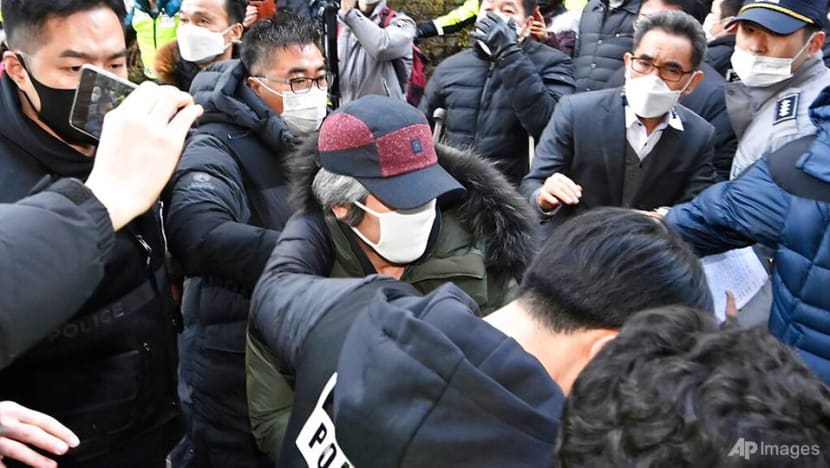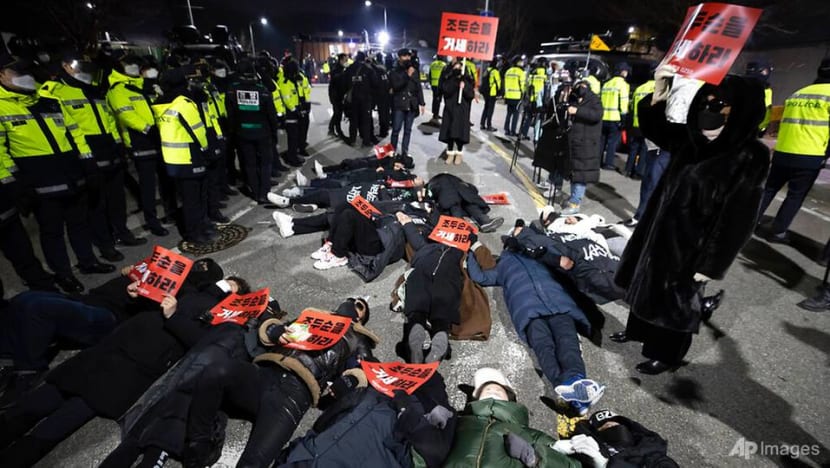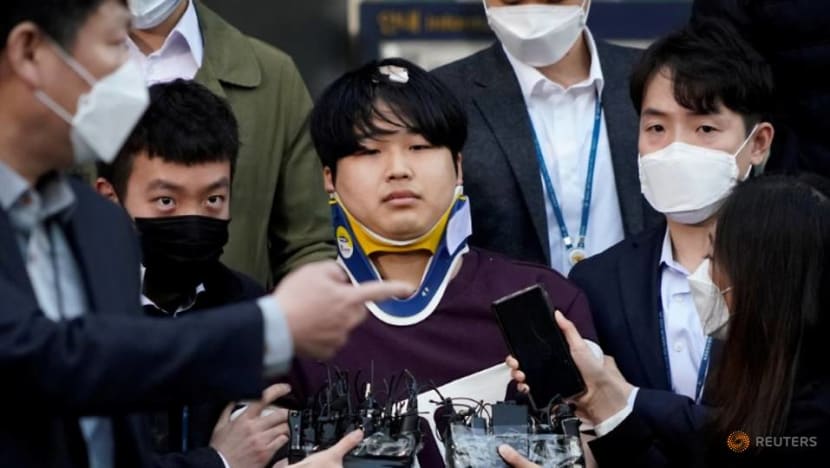commentary Commentary
Commentary: Why a convicted rapist’s release in South Korea stirs anguish 12 years after the crime
Cho Doo-soon, the perpetrator of a horrific rape case involving an 8-year-old, was released last week, stirring up public outrage over South Korea’s leniency towards sexual misdemeanors. The system is changing but not quite enough, says Steven Borowiec.

Cho Doo-soon (centre) escorted by police officers, arrives home in Ansan, South Korea, on Dec 12, 2020. (Photo: Kim Jong-taek/Newsis via AP)
SEOUL: The criminal record of now notorious 69-year-old Cho Doo-soon includes but is not limited to the brutal rape of a child.
On Cho’s rap sheet are 17 more criminal convictions including theft, assault and other sexual offences including another rape conviction.
Cho has been a subject of national shame in South Korea, after committing the rape of an eight-year-old girl in 2008. One morning, while the victim was walking to school in Ansan, Cho accosted her, dragged her into a church restroom where he committed the heinous crime, and then left her for death.
The details of Cho’s violent attack on the young victim are too horrific to recount. Suffice to say the physical wounds and emotional trauma he inflicted on the girl and her family will never heal.
Then Cho made himself even more loathsome by attempting to shirk responsibility for his crimes, claiming not to remember what he had done because he was drunk at the time.
READ: Commentary: Is drinking the problem in cases of sexual assault?
PUBLIC OUTRAGE OVER LENIENT SENTENCE
A criminal with Cho’s track record of atrocities probably deserves to be locked up and never heard from again – at least according to the thousands of petitions against his return to society.
Yet Cho has again become a source of rancour after having been released from prison. He was freed last week after serving 12 years for the 2008 rape.
The normally quiet street that Cho now lives on in a city south of Seoul was recently overwhelmed by protestors who threw eggs and garbage at his house while hurling insults.

While Cho must wear a tracking device and live under police supervision, South Koreans are outraged by what many describe as a preposterously lenient sentence.
In deciding his sentence, a court had determined Cho’s inebriation made him somewhat less responsible for his actions. The court also considered that Cho was mentally infirm.
A SYSTEM THAT GOES EASY ON SEXUAL CRIMINALS
Cho’s sentence is the best-known example of the South Korean legal system’s tendency to go easy on men who commit sex crimes.
The court had explained their judgment that the consumption of alcohol had put the man into some kind of temporary psychosis, making it impossible for him to control himself.
In many other cases of sexual assault, the courts have also factored in whether the perpetrator had made a credible apology in demonstrating remorse and swore to never repeat such an act.

READ: Commentary: BIGBANG Seungri’s sprawling scandal brings sexual misconduct secrets into the light
Or the judge might say a harsh sentence would ruin a young man's future prospects and the court ought to go easy on him.
Yet none of those explanations hold water in Cho’s case.
As if the sheer barbarity of the 2008 rape wasn’t enough, his history of violent crime should have convinced any jurist he is a danger to society and ought to spend the rest of his days behind bars.
READ: Commentary: Here’s what zero tolerance towards sexual misconduct looks like
READ: Commentary: Sex, violence and accusations of cover-ups rock South Korea
IN ANOTHER CASE, 40 YEARS
There is at least one indication that this culture of baseless leniency towards sexual crimes could be changing.
In November, Cho Ju-bin, the operator of a network of underground online chatrooms that trafficked in images of child rape and sexual exploitation – networks also infamously known as “nth rooms” - was sentenced to 40 years in prison.
The chatrooms Cho operated charged members a fee to view videos of child rape and gruesome footage of sexual acts victims had been coerced into undertaking.
He had carried out scams where he would lure victims with promises of high-paying jobs into sending him sexual photos, then blackmail them into demeaning, even more sexual acts, on the threat that he would release the images in his possession to the victim’s school or employer.

In at least one instance, this reportedly included compelling a victim to carve the word “slave” into her body.
Prosecutors had sought a life sentence for the 25-year-old. Yet, even a sentence of 40 years for a man whose sadism tormented at least 74 people, 16 of whom were underage and whose crimes earned him millions of won in cryptocurrency from a pay-to-view subscriber list of 260,000 seem insufficient.
The sheer scale of the crime - the number of victims involved and the people who not only witnessed but took pleasure in their torture - is heart-wrenching.
READ: Commentary: Safety still a concern for women taking Jakarta public transport
THE CULTURE IS CHANGING BUT NOT FAST ENOUGH
An optimistic assessment is that Cho Ju-bin’s sentence represents progress, that even though he is young, the judiciary gave him more than a slap on the wrist. The court prioritised protection of the South Korean public and sending a strong deterrence message.
Much of the credit for any progress must go to women’s groups and other civic organisations who exerted pressure on judges and elected leaders to get tougher on sex crimes. Activist groups documented Cho Ju-bin’s acts and held regular protests to make it harder for the public to move on and forget what had happened.
South Korean legislators who passed bills to criminalise the viewership, purchase and possession of such illegal material in April also deserve mention in this fight for justice against such acts.

As the father of a 16-month-old girl, it has been impossible to assess these cases with detached objectivity.
As I write this, the rage I feel when reading about these acts is only tempered by the sound of my daughter giggling as she plays in the next room.
I hope Cho Doo-soon’s release will act as an unfortunate reminder of a past mistake, of a legal culture that did not take sex crimes sufficiently seriously. That fact that he is now free should be evidence of the need to do better in the future.
The writer James Baldwin said: “I can’t be a pessimist, because I’m alive.”
In my case, I have little choice but to remain optimistic about South Korea’s gender relations.
I am raising a girl. I must believe that the country she is growing up in is aspiring to be fairer and safer for her than it was in the past.
Steven Borowiec is a writer, journalist and broadcaster based in Seoul.














